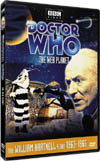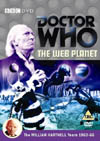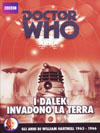DVD Extras include:
Episode One GaffesOnce more, camera angles begin to needlessly miss the mark. Vicki makes her entrance and delivers her first lines off-screen, only because the cameraman is told to aim for a four-shot and can't move back far enough to get all the TARDIS crew-members in the frame. William Hartnell delivers the worst flub of his entire Doctor Who career, as he completely forgets his lines, and can't even invent a few new ones on-the-fly as usual. William Russell is no help at all during this moment, his blank, inquisitive persistence adding more pressure and dead air-time to the proceedings. Painful to watch.The TARDIS is used as an exploration tool in this story, and not just a means to drop the characters into the setting. Nicely plotted. More stories should use the TARDIS this way. The deep interior returns, and the astral map is a nice new addition. On the minus side, the inlay effect used to make the TARDIS fade partially away and come back is extremely poorly aligned, calling attention to the way the effect was mis-handled. It's not easy to throw an actor's lips and voice out of synch on this program, seeing as how it was taped practically live, yet Richard Martin manages to capture such a moment for episode one's cliffhanger. Luckily this is fixed for the opening of episode two, but it's a little late.
A Shift for Episodes Two Through SixThe technical faults of the story's production become less glaring (although still present) for the remaining five episodes, as the source of greatest naff-ness shifts onto the guest Menoptera characters. Despite excellent costume design and an incredible set, our director would again have us believe that alienness and high-pitch voices with unnatural emotional delivery go hand in hand. Once again, technically-dodgy spectacle undermines character and drama instead of enhancing it.All scenes on the exterior of the planet Vortis are shot with grease or filters on the lens. This helps to cover up imperfections in the sets and costumes in an interesting way (okay, that's good), but it also covers up many of the subtleties of expression on the main characters' faces and makes one want to adjust one's set to get a clearer picture (okay, that's bad). More discrimination should be used in applying this effect, particularly its position in the frame. The music tracks imported for use in this story are fairly good - they're "out-there" in terms of style, yet also create a good moody quality for the story. Jacqueline Hill (Barbara) gets a holiday during episode three, and this is an interesting way of dealing with a companion's absence. Barbara has been captured, and is forced to work as a Menoptera slave. Nothing of note happens to her, and she doesn't do anything, so we are spared any plot-dead scenes. Not bad. Action rightly focuses on the Doctor, Ian, and Vicki, and their growing ability to communicate and negotiate with the forces controlling the Zarbi. The plot rightly keeps attention fixed where things are at their most interesting. Further depths of silliness are reached, literally, when Ian and the lead Menoptera character (and choreographer) are forced underground for the entire second half of the story, where they meet a sub-race of "Optera" whose performances are a put down even to children. While this coughs up a bit of cultural exploration from a story point of view (and by God, what a cheesy culture it is!), it does absolutely zero for the plot and simply wastes the time of Ian and the lead Menoptera guest character. Ian could've had a holiday like Barbara for an episode, sparing us the worst 1/3 of this silliness, but this doesn't happen. Despite her one episode absence, Barbara begins to get the best that this story has to offer. She organizes action and freedom, and restores hope for the good guys, and she is the only main character involved in one of the most beautiful scenes of the story where the Menopteras' flying ability is demonstrated and the Zarbi are on hand to provide more action and a dramatically wrenching plot-twist, further hampering the good guys' plans. Unfortunately, the Doctor is partly responsible for the detrimental events.
Where is Hilio?Martin Jarvis has proven himself to be an exceptional actor, so it is interesting to see what he does before his career really took off with the heavily costumed role of Hilio, the Captain of the Menopteras' Spearhead Attack Squadron, despite the questionable directing of both Richard Martin for voice quality and Roselyn de Winter for "insect movement". In fact, he does appear to be the one Menoptera who still manages, through the above-mentioned restrictions of portrayal, to convey a sense of both charisma and guts, not to mention a clear-headed focus on his duty. Richard Martin apparently has no idea that he has a rising star on his hands, and does Jarvis's Hilio the greatest injustice in rendering his character unnoticeable. There are practically no close-ups of Jarvis, particularly in his more emotional scenes. In fact, he's lucky enough to be included in long-shots and group shots, and he has to deliver many of his best lines either off-screen or with his back to the camera. Way to go, Richard. If I hadn't specifically been looking for this performance, I wouldn't have noticed it myself. In fact, extremely little seems to have been done to make any of the alien characters stand out as individuals among members of their own species. Judging by the visuals that appear in the end product, it's almost impossible to tell whether the make-up artists made an attempt to differentiate them or not. Perhaps the restored version on the DVD can shed new light on this...
Anticipation builds....The Doctor spends much of his time helping the enemy under duress in this story, making it all the more important that he redeem himself with some heroics in the end. He gets off to a good start in episode five, figuring out how the enemy controls the Zarbi with gold, and turning this to his advantage in capturing one. He also teams up with Barbara and her band of rebel spearhead Menoptera, and together they come up with a multi-pronged attack plan that will put the Doctor in the most heroic position - one in which he could first use his oratory skills to confuse and placate the enemy, and secondly to deliver the final defeating blow. All is set for the kind of Doctor Who conclusion that we've all been long-awaiting. As I say, a well-structured plot.
...Failure to DeliverWhat actually happens in the final episode and the cliffhanger leading up to it is rather disappointing. The Doctor appears to be all pre-planning talk and no stamina. His repeated reassurances to guard and protect the isotope turn out to be a joke, as he casually gives it to Vicki, who by some measure of idiocy thinks it will do more good if it is safely hidden in the astral map. This is the final attack! Not a time to be playing it safe! Unable to muster any negotiating power or ability to spellbind the villain and the audience with his words, the Doctor is quickly covered in cobwebs (nice effect, but blandly directed), and he spends episode six lying on the floor muttering uselessly, waiting for someone else to pick up the ball he and Vicki so listlessly dropped. Barbara and Hilio have to do their own job in the attack, and come back to do the Doctor's part as well. Thanks a lot, Doc! Ian and his friends show up at the very last minute, and manage to contribute nothing whatsoever to the plot's conclusion. They could have just as easily remained lost.A lot of hype is centered around the so-called important advice of aiming the isotope at the dark-side. Imagine a Star Wars which ends with a minor character like Wedge Antilles coming to the end of the Death Star trench and finding out that there is no exhaust port. Luke Skywalker has ejected from his X-Wing early in the final attack, there is no talk of "The Force", or a last minute helping hand from sidekick Han Solo. Wedge just shrugs his shoulders, pulls away, and the Death Star decides to slowly fall apart all by itself. This is close to the equivalent of what we get in the final episode "The Centre", and it sucks. In fact, there isn't even any clear indication that Barbara can't find the dark-side.... the action is just simply a poorly motivated mess, in which none of the characters display any charisma at all, and the set simply looks cheap and cheesy, even before it falls apart. This is a real cop-out of an ending, particularly in the writing, and doubly-bizarre because such an excellent ending was set-up in the previous episode. Someone really went out of their way to mess this up. In an interview in issues 232 and 233 of Doctor Who Magazine, Richard Martin admits to making a few amendments to what he considered (probably quite rightly) to be a poor script. His amendments do not seem to be much improvement, as he proceeds to take credit for the entire underground "Optera" sub-plot. I wouldn't be surprised if he adjusted the final episode for less dramatic dialogue (William Hartnell's strength) and more action (resulting in Zarbi vs. Menoptera rugby/football), which is a preference he would argue for single-mindedly in David Whitaker's presence. Well, this sci-fi fan feels no need for action to suppress drama in my favourite genre. Quite the reverse in fact - action must also be dramatic if it is to be powerful, whether it is in a sci-fi, or any other type of story. To top it off, our hero for the story (Barbara) is practically ignored by the Menoptera in the final departure scene, while the Doctor takes all the credit. Pompous wretch! He did more to aid the villain, even though his hearts weren't into it. Ian wasn't much help either, yet the Menoptera spend most of their time thanking the men. I don't mind a companion taking over the role of hero for a story or two, but they should take credit for it as well. William Hartnell's Doctor is undermined as a character not only by not being the hero when he should have been, but also by taking heroic credit which is not his due. The fight within the BBC for Doctor Who to be taken seriously as a drama, as opposed to a children's show, is well documented. With that in mind, note that Richard Martin had this to say in his Doctor Who Magazine interview: "We were just doing a fairly crappy children's series which actually had a bit of popularity." Children's show mentality certainly seems to reign in these six episodes at least, and they are the worse off for it. Today's concept deserved a far more serious execution.
International Titles:Deutsch: (Der Netzplanet)
English Novelization: "The Zarbi"
Meanwhile, the Spanish title for episode one became "The Mysterious Planet". Of course, if we used that for the Spanish title for the entire adventure, we'd be all set to have a conflict with story no. 144, the Colin Baker adventure that forms the first segment of "The Trial of a Time Lord". So perhaps it's best to do like the novelization, and use episode two's title for the complete story in Spanish.
Original English: "The Web Planet"This story has become available on DVD and VHS video. Click on the Amazon symbol for the location nearest you for pricing and availability:
Comments on this article are welcome. You may contact the author from this page:
|










